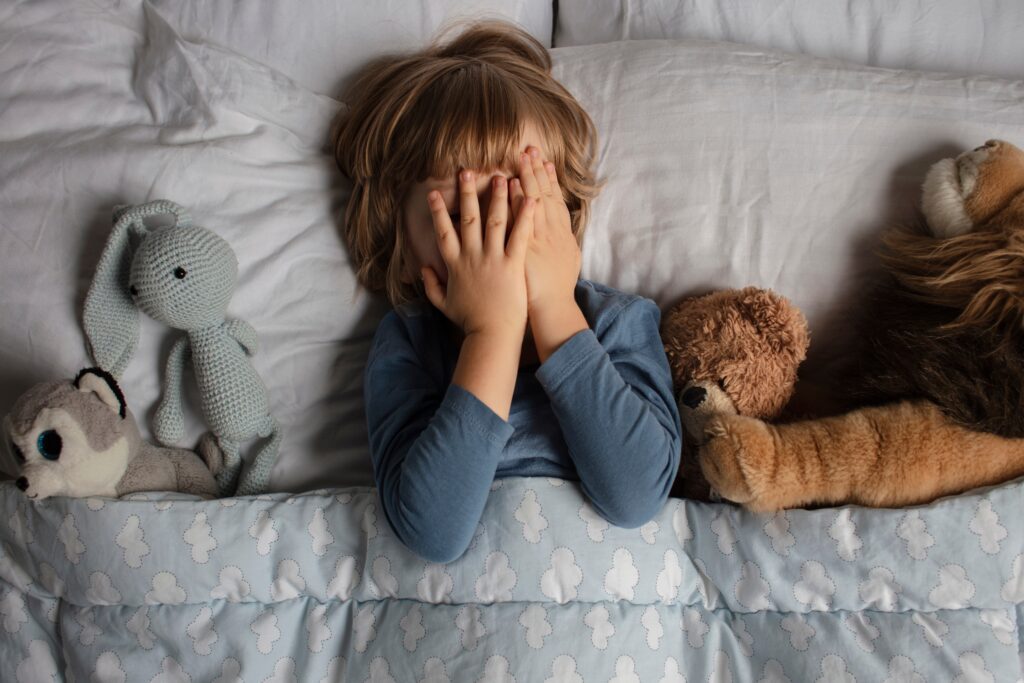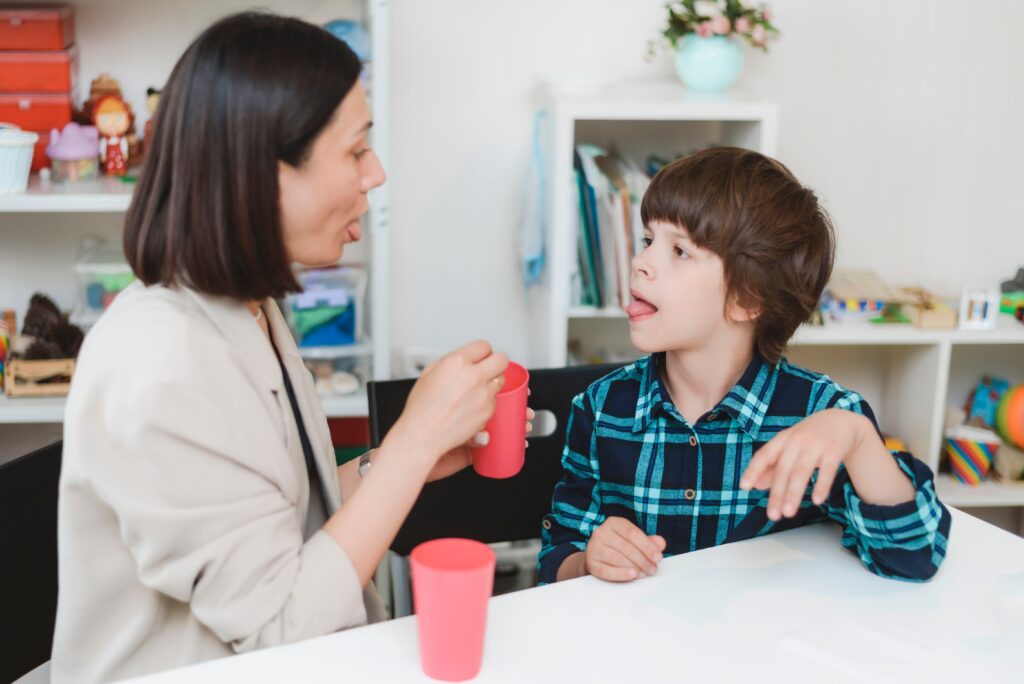
Blog
Nighttime Drooling in Kids: Is It Normal or a Red Flag?
Author: DrSensory
June 9, 2025
Nighttime Drooling in Kids: Is It Normal or a Red Flag?
Many parents notice their children drooling, especially during the early years. While drooling is common in infants and toddlers, nighttime drooling is something that can raise questions for many parents. Is it a normal phase of development, or could it indicate an underlying issue? Understanding the causes of nighttime drooling and when to seek an evaluation can help you ensure your child’s oral health and development are on track.
In this article, we’ll explore the connection between drooling and oral motor development, what factors can contribute to nighttime drooling, and when it’s time to consult a pediatric dentist or healthcare provider.

Oral Motor Development and Drooling
Drooling occurs when excess saliva escapes the mouth. While this is a normal part of early childhood, it can also be linked to oral motor development. The muscles in the mouth and face are responsible for controlling the flow of saliva, as well as for swallowing. During the early stages of development, children are learning how to control these muscles, which can lead to some degree of drooling.
For infants, drooling typically starts around 2 to 3 months of age as they begin to develop the muscles needed for sucking, chewing, and swallowing. As your child grows and their oral motor skills improve, drooling generally decreases. However, when drooling continues into older childhood or is particularly noticeable during sleep, it may indicate an issue that requires attention.
Signs Your Child May Have a Hidden Oral Restriction
When Does Nighttime Drooling Become a Concern?
Nighttime drooling is normal in babies and toddlers, but when it persists in older children—particularly after age 4—it may be a sign of an underlying issue. In this article, we’ll explore what’s considered normal, when to seek help, and how excessive drooling may connect to oral motor development, bite alignment, or airway problems.
Is Nighttime Drooling Normal for Young Children?
It’s common for infants and toddlers to drool during sleep, especially during certain developmental stages. Some typical, non-concerning causes of nighttime drooling include:
Teething: Increased saliva production during teething often leads to drooling.
Sleep Stages: Muscle relaxation during deep or REM sleep can naturally cause drooling.
Developing Oral Motor Skills: Some children simply need more time to master full control of their lips, jaw, and tongue coordination.
How Sleep Regression Affects a Child’s Development
The Importance of Brushing Teeth Starting at a Very Young Age
When Nighttime Drooling Signals an Underlying Issue
If your child is over 4 years old and still drooling significantly at night, it may be more than a harmless habit. Look out for these warning signs:
➤ 1. Drooling Beyond Age 4
Persistent drooling past age 4 could indicate a delay in oral motor skill development or poor muscle tone in the mouth and face.
➤ 2. Difficulty Eating or Swallowing
If your child eats with their mouth open or struggles to swallow properly, saliva control may be affected by weak oral muscles or poor coordination.
➤ 3. Speech Delays or Bite Changes
Slurred speech, lisps, or noticeable changes in how the teeth align may point to oral structural issues—which can also contribute to nighttime drooling.
➤ 4. Mouth Breathing
Kids who breathe through their mouth during sleep may also drool more. Mouth breathing often points to airway obstruction (e.g., enlarged adenoids) and can lead to issues like dry mouth, snoring, and drooling.
How Dental Alignment Affects Chewing and Swallowing in Children
Can TMJ Issues Start in Childhood? Early Symptoms to Watch For
Dental and Medical Conditions Linked to Drooling
If nighttime drooling is persistent or worsens over time, your child may need a professional evaluation. Here are a few conditions that could be at play:
🗣️ 1. Oral Motor Dysfunction
Weakness or lack of coordination in the tongue, lips, and jaw can interfere with saliva control. A pediatric dentist or speech-language pathologist can recommend therapies or exercises to improve function.
🦷 2. Jaw Misalignment or Bite Issues
Structural issues, like an overbite or high palate, can impair the natural resting posture of the mouth, contributing to drooling. A dental evaluation can determine if your child’s oral development is on track.
😮💨 3. Sleep Apnea or Airway Blockage
Conditions like obstructive sleep apnea, enlarged tonsils, or chronic sinus congestion can force a child to breathe through the mouth, increasing drooling. In such cases, a referral to an ENT specialist or sleep doctor is important.
🧠 4. Neurological Conditions
Though rare, excessive drooling may be associated with neurological disorders like cerebral palsy or muscular dystrophy. If your child also struggles with muscle tone, coordination, or developmental milestones, consult a pediatrician for further testing.
Dental Signs of Sensory Processing Differences in Children
When Is Thumb Sucking a Problem? A Developmental Guide for Parents
When to See a Specialist for Nighttime Drooling
Early intervention can make a big difference. Here’s who to contact if you’re concerned about your child’s drooling:
Pediatric Dentist – for bite issues, oral motor concerns, and jaw development
Speech-Language Pathologist – for drooling related to speech and swallowing function
ENT Specialist or Sleep Doctor – for mouth breathing, snoring, or suspected airway obstruction
Pediatrician – for developmental concerns or signs of neurological conditions
What Can Parents Do?
As a parent, there are a few strategies you can try to help reduce excessive drooling:
- Encourage Nose Breathing: If mouth breathing is contributing to drooling, encourage your child to breathe through their nose, especially during sleep. This can help improve their oral posture and reduce drooling.
- Myofunctional Therapy: In some cases, working with a speech therapist or myofunctional therapist can help strengthen the oral muscles and improve swallowing coordination, reducing drooling.
- Dental Evaluation: Regular dental checkups can help identify any underlying issues with tooth alignment, jaw development, or oral function that may be contributing to nighttime drooling.
- Support Healthy Sleeping Habits: Ensuring that your child sleeps on their back with their head slightly elevated can help reduce drooling. A comfortable pillow may also help encourage proper neck and jaw positioning during sleep.
How Sleep Regression Affects a Child’s Development
Living with Sensory Processing Disorder: Daily Tips, Support Strategies, and Family Guidance
Drooling is Common, But Persistent Drooling Should Be Evaluated
Nighttime drooling can be a normal part of childhood development, but it’s important for parents to be aware of when it becomes a concern. If your child’s drooling persists beyond the expected age or is accompanied by other signs of oral motor issues, speech delays, or jaw misalignment, seeking professional evaluation is the best way to ensure your child’s health and development are on track.
By staying proactive and addressing any concerns early, you can help your child develop the skills they need for better oral function and overall health.

Frequently Asked Questions About Drooling in Childhood
Is it normal for a 5-year-old to drool while sleeping?
Occasional drooling can be normal, but persistent drooling in a 5-year-old may indicate oral motor delays or airway issues and should be evaluated.
Can mouth breathing cause drooling at night?
Yes. Mouth breathing during sleep often leads to drooling and may be a sign of enlarged tonsils, nasal blockage, or sleep-disordered breathing.
Who should I see if my child drools a lot at night?
A pediatric dentist, speech therapist, or ENT specialist can evaluate the cause and recommend treatment options based on your child’s specific needs.
related blogs
Your child is constantly moving, crashing into furniture, or having meltdowns in response to seemingly minor things like a loud
Your toddler refuses to wear certain clothes, has huge meltdowns in noisy places, or is an extremely picky eater, limited
Your child seems to miss verbal instructions, struggles to follow conversations in noisy environments, and often asks "what?" even when
On the surface, autism and Ehlers-Danlos syndrome (EDS) might seem like two entirely unrelated conditions. One is a neurodevelopmental condition
The intense head pain begins, lights feel blindingly bright, and every sound seems amplified to an unbearable level. You retreat











































































